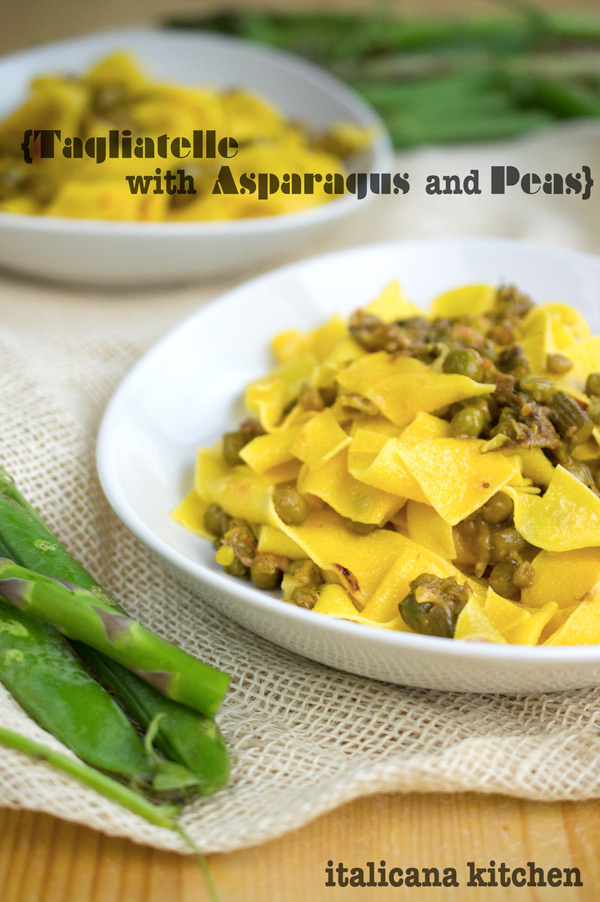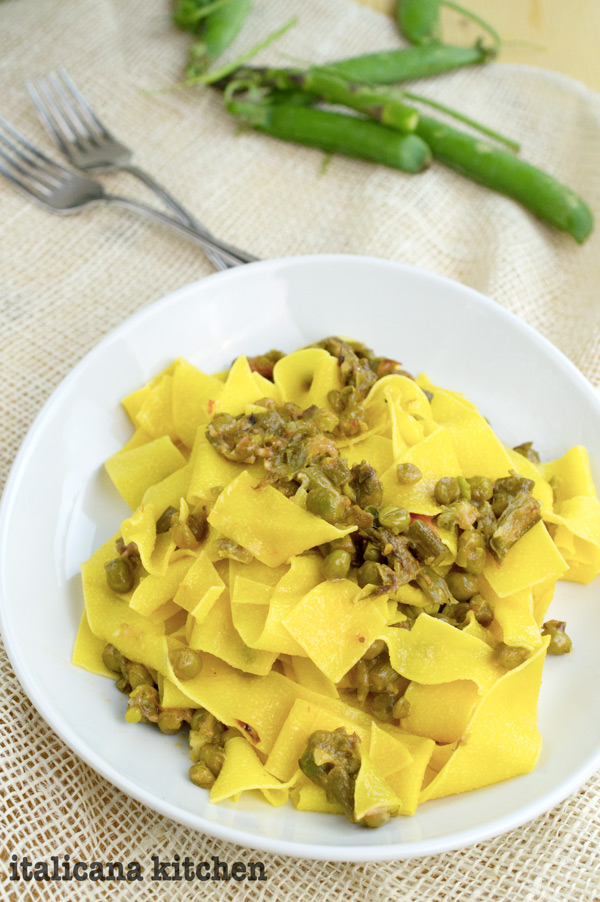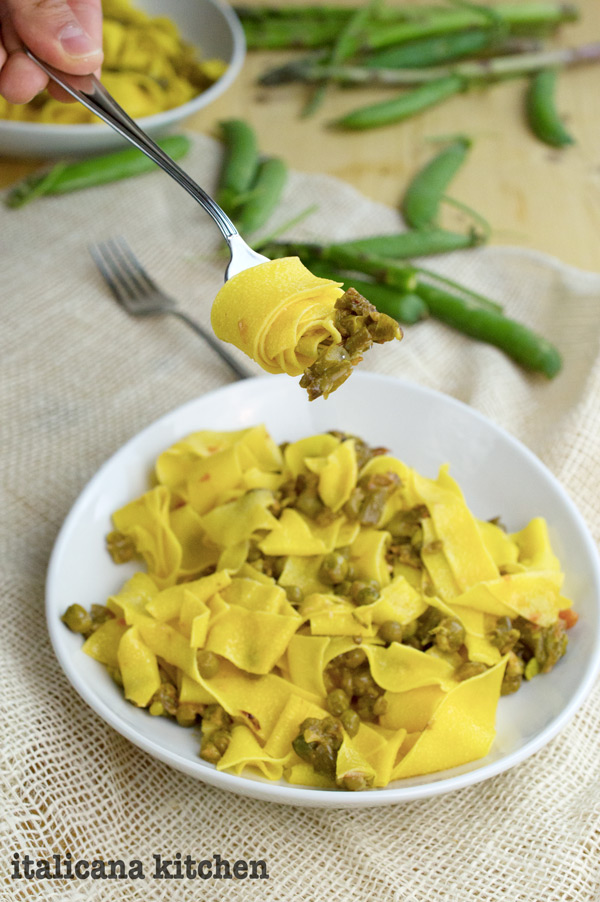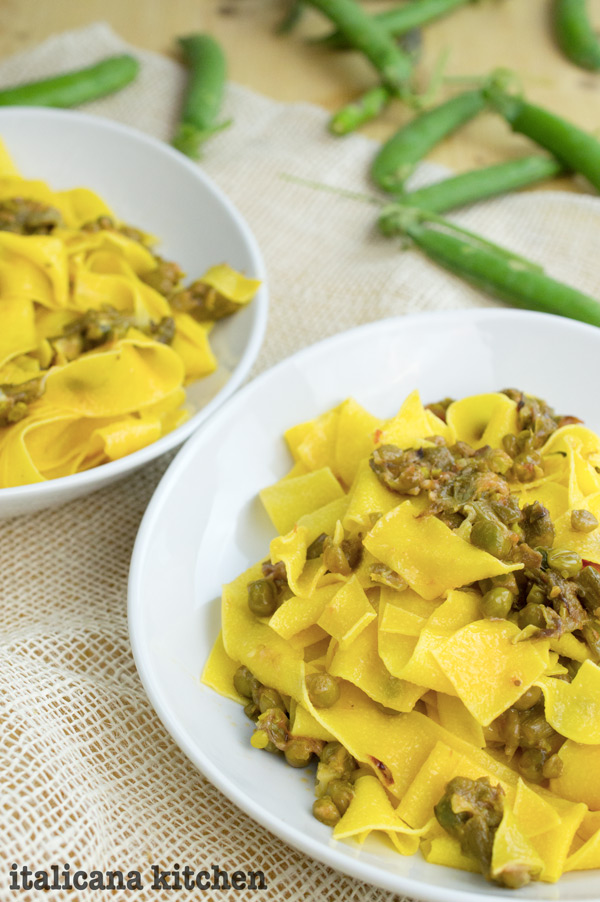Pasta dishes don’t have to always be smothered in tomato sauce :: sugo and loaded with meat to be satisfying. In fact, some of the best Italian pasta dishes are those made with a vegetable sauce, like this recipe for tagliatelle with asparagus and peas given to me by my aunt-in-law.
 There are three main secrets to preparing a delicious pasta dish like they make in Italy :: Italia:
There are three main secrets to preparing a delicious pasta dish like they make in Italy :: Italia:
1. Use fresh seasonal produce
2. Cook the pasta in generously salted water until it is al dente (slightly firm when bitten).
3. Top with freshly grated parmigiano reggiano cheese.
 Italian women are clever :: furbe; they prepare mouthwatering dishes with just a few ingredients. What is their secret? They buy fresh vegetables that are in season. Often Italian women have a vegetable garden at home, otherwise they head directly to a farmer or vegetable stand at the market. Choosing good in-season vegetables allows you to enjoy the maximum flavors since the produce is in its prime. Good sauces aren’t difficult to make, they only need fresh and flavorful raw materials.
Italian women are clever :: furbe; they prepare mouthwatering dishes with just a few ingredients. What is their secret? They buy fresh vegetables that are in season. Often Italian women have a vegetable garden at home, otherwise they head directly to a farmer or vegetable stand at the market. Choosing good in-season vegetables allows you to enjoy the maximum flavors since the produce is in its prime. Good sauces aren’t difficult to make, they only need fresh and flavorful raw materials.
 The next important trick is how you cook the pasta. The first rule of thumb of a good Italian cook is that you should always add coarse salt to the water once it comes to a boil. Secondly, you should always read the cooking time on the outside of the pasta package and be sure to start checking the pasta’s firmness a minute or two before it should be ready, especially if you mix the pasta with a sauce over heat, like in this recipe, as it will continue to cook. Although overcooked pasta is perfect for those who wear dentures :: la dentiera, it is by no means good. So set a timer folks and cook the pasta al dente!
The next important trick is how you cook the pasta. The first rule of thumb of a good Italian cook is that you should always add coarse salt to the water once it comes to a boil. Secondly, you should always read the cooking time on the outside of the pasta package and be sure to start checking the pasta’s firmness a minute or two before it should be ready, especially if you mix the pasta with a sauce over heat, like in this recipe, as it will continue to cook. Although overcooked pasta is perfect for those who wear dentures :: la dentiera, it is by no means good. So set a timer folks and cook the pasta al dente!
 The last important tip to making this tagliatelle with asparagus and peas dish absolutely delicious, is to load it with freshly grated parmigiano reggiano cheese. I might be impartial since I live in Emilia Romagna, the origin of this delectable ingredient, but I can definitely tell you there is a major difference between pasta dishes with and without parmigiano reggiano. And, no, for all you Americans, I am not talking about the powdery stuff in the cylinder green tube made by Kraft, that stuff for Italians has the same affect as kryptonite on Superman.
The last important tip to making this tagliatelle with asparagus and peas dish absolutely delicious, is to load it with freshly grated parmigiano reggiano cheese. I might be impartial since I live in Emilia Romagna, the origin of this delectable ingredient, but I can definitely tell you there is a major difference between pasta dishes with and without parmigiano reggiano. And, no, for all you Americans, I am not talking about the powdery stuff in the cylinder green tube made by Kraft, that stuff for Italians has the same affect as kryptonite on Superman.
There you have it, some of the most important tricks :: trucchi you need to know to make some tasty Italian pasta dishes. If you have any other tips, leave them below in the comments section.
- ¼ cup extra virgin olive oil
- 1 shallot, thinly sliced
- 10 asparagus spears, hard ends snapped off & discarded, then chopped
- 1 cup (145g) freshly shelled peas
- 1 organic vegetable bouillon cube
- White wine, enough to cover the vegetables
- 4 datterini or grape tomatoes, skin removed (I freeze the tomatoes then the skins just pop off under water)
- ½ cup (38g) parmigiano reggiano
- 200g tagliatelle pasta (or any kind of pasta)
- ½ tablespoon coarse salt
- In a medium-sized saucepan, cook the shallot in the extra virgin olive oil over low heat. When the shallot begins to become golden brown, discard.
- Add the asparagus, peas, tomatoes, vegetable bouillon cube and white wine (enough to cover the vegetables); bring to a boil then reduce the heat to simmer. Cook for 40-60 minutes.
- Bring a pot of water to boil, add the course salt and cook the pasta according to the instructions located on the package. Check the doneness around 1-2 minutes before it should be ready, remove from heat and drain when it is al dente (slightly firm when bitten).
- Add the pasta and parmigiano reggiano cheese to the sauce previously prepared and stir over low heat until combined and the cheese has melted. Serve immediately. Buon appetito!
- Note For vegetable based sauces, I like to cook them around 40 minutes but you could also let them simmer for less time.

Hi! Love your blog, but I’m going to contest your first point. I’ve found many pasta sauces don’t need to be cooked at length, especially the vegetable-based ones. I only cook many sauces 15-20 minutes tops, including l’Amatriciana or my zucchini and pepperoncino pasta. And, yes, freshly grated parmesan cheese is good, but some pasta dishes scream for pecorino.
Hello Helen, Thank you for your kind words. This recipe was passed down to me from my Italian aunt-in-law, so I followed her cooking instructions. Even with the longer cooking time the asparagus and peas stay firm and all of the vegetables become deliciously marinated together. The next time I make this recipe, though, I’ll try it with a shorter cooking time as you suggested, to see if there is a difference in the flavor. Obviously, if the flavor isn’t affected and the sauce can be made in less time, all for the better! Since I’m based in Emilia Romagna I’ve been impartial to Parmigiano Reggiano but I absolutely agree about how certain dishes call for pecorino.